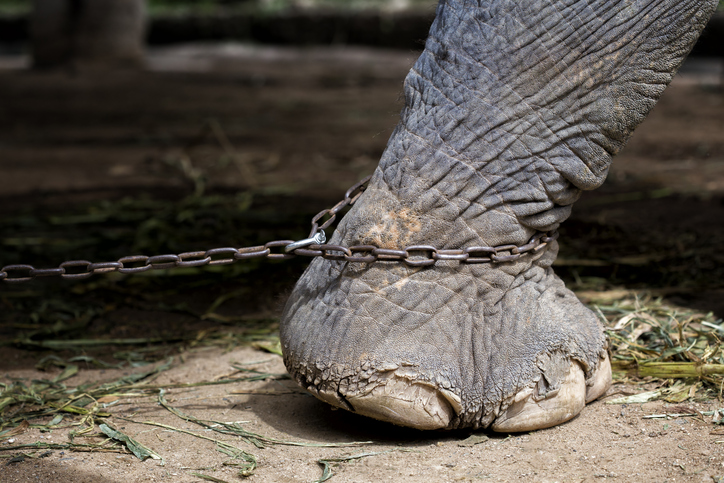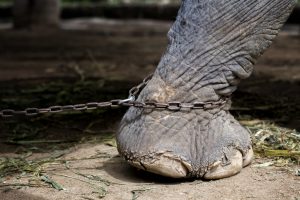Codependency: Why the Elephant Doesn’t Break Its Chain
by Paul Chubbuck
The circus visitor observed the elephant curiously and asked the caretaker, “Can’t that huge elephant easily break that little chain or pull that small stake out of the ground?”
“Yes, he could”, said the caretaker, “but when he was just a little tyke, we chained him with an unbreakable chain and a big stake pounded deeply into the ground. He pulled and pulled for weeks until he gave up. Then, as he grew, we made the chain and stake smaller and smaller and he’s never tried to escape since.”
Dysfunctional families damage children’s boundaries and self-confidence
Did you grow up in an abusive or dysfunctional home? If you did, you may identify with this elephant. At age one or two or three you expressed your needs, set your boundaries, asserted your frustrations and joys in a manner perfectly appropriate to your age. But as those responsible for your care did not seem to hear or respect you, or perhaps even punished you for your self-expression, you gradually gave up. What else could you do? They were bigger, and your life depended on them. Clearly you are a survivor, but part of you gave up trying to be who you really are: free, creative, and joyful, like the elephant.
How is it that parents or families “chain” little ones? The methods are usually unconsciously passed on from the parenting methods which were previously used on them, or sometimes questionable methods recommended by authorities. Your parents couldn’t see the manipulation, control, or abuse that they were passing on nor the harm it did to their children. They simply thought that’s the way it was done. It seemed normal to them. In fact, as Alice Miller writes in “Banished Knowledge: Facing Childhood Injuries“, until one has begun a path of recovery from such abuse, that person will have little capacity to recognize such abuse anywhere in their world. Whether they are parents, teachers, police, judges, bosses, doctors, politicians, or any other role in society, they are likely to be culpable in unconsciously either perpetrating such abuse on vulnerable people, or enabling others to do so.
Examples of childhood abuse
- Scolding with harsh voice tones: “How dare you speak to me in that tone of voice!”
- Spanking and other corporal punishment
- Correction of behavior with judgment or shaming: “You are a very bad girl!”
- Telling the child what they are feeling: “No, you are not angry at Mommy.”
- Interpreting the child’s motives without inviting the child to speak for themselves: “You are so mean to your sister!” or “You said that because you’re selfish.”
- Using a larger physical body to threaten, intimidate, or bully.
- Using more experienced intellect to bully, intimidate, or shame: “No, you wouldn’t understand.”
- Using shaming labeling: “You are such a pest.”
- Threats of abandonment or other dire consequences: “If you don’t behave right now, Daddy will just leave you here.”
- Expecting or demanding that the child meet the parent or caregivers emotional needs, rather than the other way around.
- Disregarding or dismissing a child’s boundaries, such as touching a child in a way that distresses the child, or not allowing a child privacy when the child wants and needs it.
- Any other kind of physical, emotional, or sexual abuse.
What all of these have in common is that they are like the big chain on the small elephant. They defeat the child’s will, independence, and spirit while the child is small and not very strong yet. Just when the child most needs protection, encouragement, reassurance, and unconditional love, instead, these treatments traumatize and diminish self-confidence and self-awareness. Something unspoken in the child says, “I can’t get what I want or need. No one listens to me. Ok, I’ll just try to survive then.”
The child’s will is defeated. The chain has won the battle.
When that child grows up, they may be quite functional and “normal”, even successful, but they will likely really struggle in their relationships. They are typically “codependent”.
I will continue in coming weeks to explore how to recognize codependency in oneself and how one can recover and create more satisfying and authentic relationships. For now, here’s a little direction and encouragement towards “breaking your chain”. It isn’t so strong as it may seem to your little elephant inside:
- Do something different which breaks your routine and which others would not expect of you, such as take a dance class or something else creative.
- Do something a bit outlandish or silly, like wading across a stream barefoot, dancing in the street, or coloring a page in a coloring book. (You don’t have to stay inside the lines either!)
- Do something unusually kind towards someone, like giving a friend a hug, give a spouse a backrub, or give a homeless person $5.
- Do something unusually kind towards yourself, like buy flowers for your own desk, put on music that makes you cry, or read a favorite passage from a beloved book.
- With a trusted, kind person, choose to share something a little more vulnerable about yourself than you typically would.
And for still more encouragement in this direction, enjoy this poem:
How Will You Feed Your Soul Today?
by Paul Chubbuck
It is possible that when you lived with that other tribe too long,
beside the river which did not drain into your sea,
you picked up some bad habits,
like chaining your soul in a small closet,
because he was causing trouble,
because she wanted too much to eat.
You might want to break that habit.
Oh, don’t misunderstand me.
If released from that closet,
he will definitely cause trouble.
She will certainly demand finer fare.
But it is only he who knows the way to the mountaintop
where the view is that you sorely need.
It is only she who can lead you to the spring
where your thirst can be quenched.
You cannot escape his rage, her hurt,
though it will help a little
if you ease his tender eyes gently into the light,
and massage her ankles where the shackles bruised.
And start a new habit.
It was only in that other tribe you learned to ask
What is wrong with my life?
Here, where the river smells like ripe huckleberries,
and the birds sing the song whose words you almost remember,
here we ask, “How will I feed my soul today?”




